‘Why would I?’: Anthony Albanese ‘hasn’t read’ additional 25 pages of Uluru Statement material
Anthony Albanese says he hasn’t read the additional 25 pages of material attached to the Uluru Statement, asking “Why would I?”
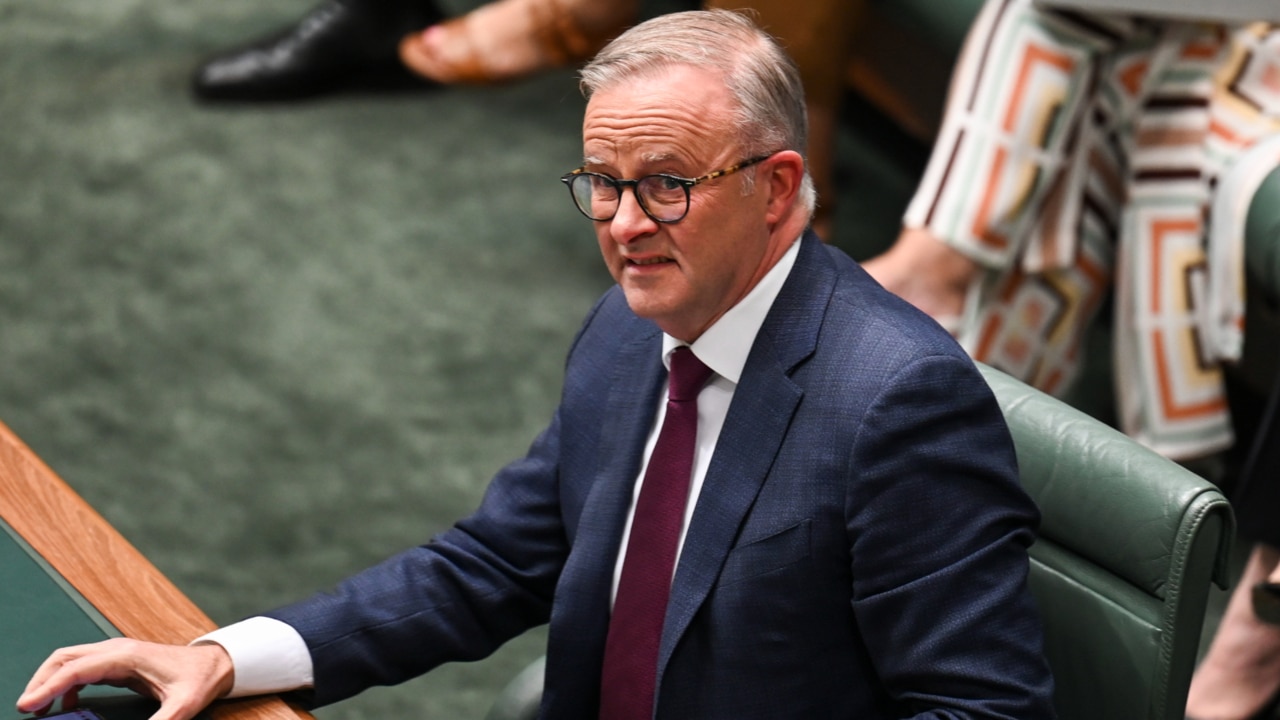
Anthony Albanese says he hasn’t read the additional 25 pages attached to the Uluru Statement from the Heart, which talk of “reparations” to Indigenous Australians under a future treaty, despite the “divisive” material being seized upon by opponents of the Voice referendum in recent weeks.
Speaking to 3AW host Neil Mitchell in an hour-long interview on Monday, the Prime Minister accused the No campaign and Opposition leader Peter Dutton of playing dirty and “saying things that they know are not true”.
“Peter Dutton knows full well that a Voice will not have a say in where the submarines from AUKUS will go, they know the Uluru Statement from the Heart is one page, not hundreds of pages,” Mr Albanese said.
“But what are the other 25 pages? I’ve read them, what are they?” Mitchell said.
“What they are is a record of meetings … they’re records of the big lead-up that happened, in the lead-up to, ironically … the Uluru Statement from the Heart,” the PM said.
“Do you agree with most of what is said in those 25 pages?” Mitchell said.
“I haven’t read it,” Mr Albanese said.
“You haven’t read it?” Mitchell said.
“There’s 120 pages — why would I?” the PM said.
“I know what the conclusion is. The Uluru Statement from the Heart is one page. That’s the conclusion. [The No campaign knows] those pages have been on the website for years, put there under the former Coalition government. I respect people can look at the same thing and come to different conclusions, yes or no, there are legitimate reasons why people would do that. But I do wish people would debate what’s real rather than what they know is not real.”
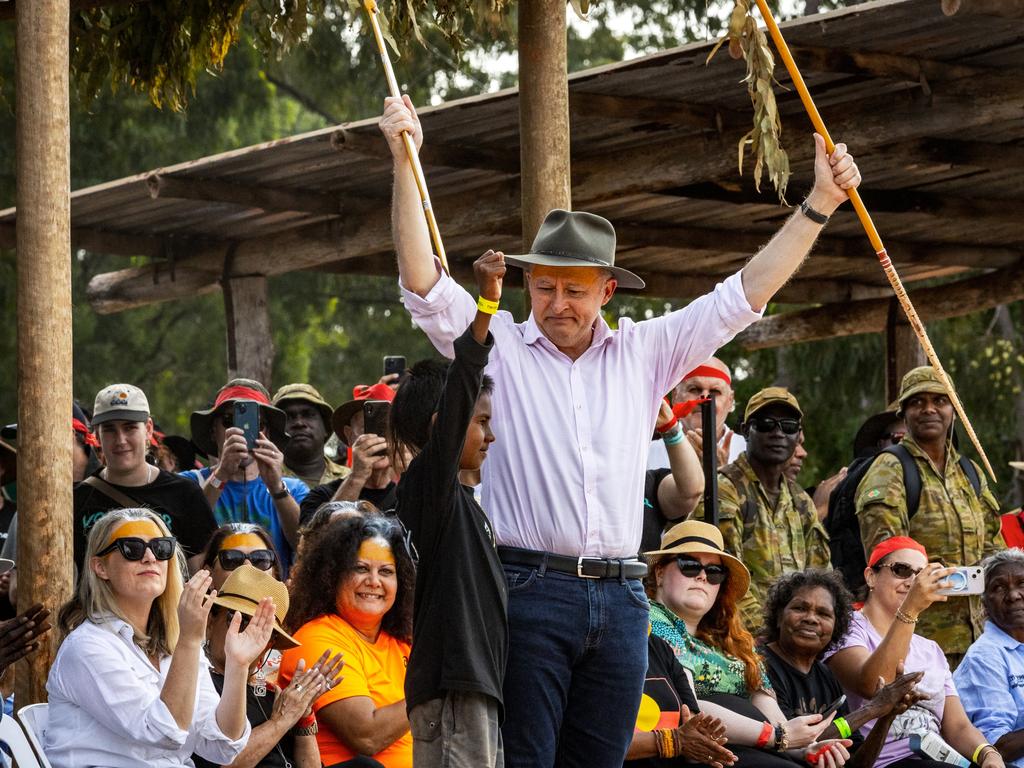
‘Astonishing’ admission slammed
Sky News host Peta Credlin, who kicked off the controversy earlier this month after she accused Mr Albanese of misleading voters by not talking about the “full” Uluru Statement, slammed the PM’s comments on Tuesday.
“‘I haven’t read it,’ he says. ‘Why would I?’ he says,” she told viewers.
“Well how about the fact that as Prime Minister of this country, you’ve said dozens and dozens of times you’re going to implement it in full? Because surely, to sign us up to something you admit you haven’t even bothered to read is madness. How do you even know what it is in full if you’ve just read the cover and not the contents?”
Credlin said it was the “constitutional equivalent of giving a whole lot of Indigenous activists a blank cheque, and he admits it”.
“This is a politician who says he’s supported the Uluru push from day one, yet he admits that he’s failed to even flick through the very material that the Uluru authors say everyone must read,” she said.
2GB host Ben Fordham on Wednesday also described the PM’s comments as “astonishing”.
“Are you serious? Indigenous leaders say you should, PM,” Fordham said.
“They say to truly understand how they arrived at the Uluru Statement it helps to read the whole document, not just the glossy one-pager. I think you can handle 120 pages.”
Fordham said Mr Albanese was “constantly saying this proposal is based on what Indigenous Australians have been asking for”.
“So isn’t it worth reading 26 pages or 120 pages so you know for sure?” he said.
“Isn’t this whole debate about listening to voices? I thought it was astonishing that the Prime Minister confessed he’s never bothered to read all the information available.”
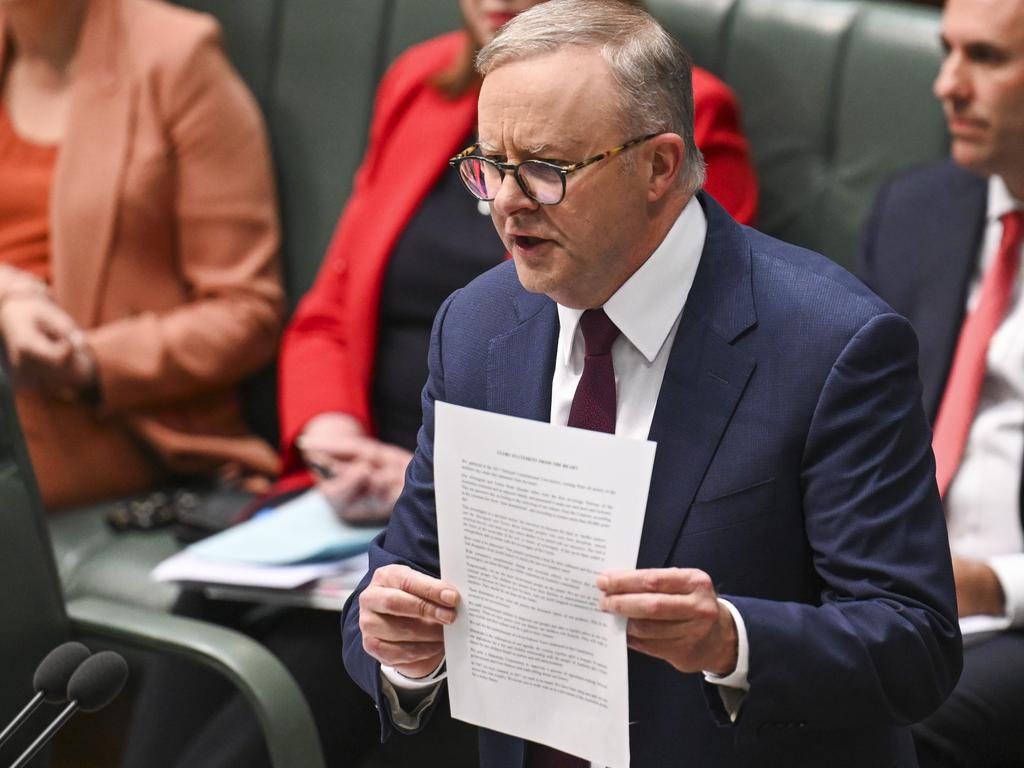
Aussies ‘not turning’ against Voice
Despite a series of polls showing support for the Voice plummeting nationwide, the PM insisted on Monday Australians were not turning against the proposal, while conceding “it’s always hard to change a constitution, and it’s so much easier to run a No campaign because you’re not trying to convince people of something positive”.
Last week, Mr Albanese accused the No campaign of spreading a “QAnon” style conspiracy theory by claiming the Uluru Statement was more than one page.
The contents of the more than 100 pages of additional Uluru Statement material were released under freedom of information by the National Indigenous Australians Agency (NIAA) earlier this year.
An NIAA spokeswoman said last week that the Uluru Statement from the Heart “is a one-page document, confirmed by the authors Noel Pearson, Pat Anderson AO and Professor Dr Megan Davis”.
“The National Indigenous Australians Agency (NIAA) released a document under the Freedom of Information Act 1982 (FOI Act), containing the one-page Uluru Statement from the Heart, followed by 25 pages of background information and excerpts of regional dialogues that informed the one-page Uluru Statement from the Heart,” she said.
Writing in The Australian on Thursday, Prof Davis slammed the No campaign’s “smear job”. “The Uluru Statement from the Heart is one page,” she wrote.
“It’s very simple. The unceasing attempts from the No campaign to take draft documents from conference rooms seven years ago and transcriptions of butchers paper seven years ago to manufacture a controversy over the Uluru Statement is farcical. It reeks of desperation.”
Ms Anderson, appearing on ABC’s 730 last Wednesday, was asked by host Sarah Ferguson to respond to one commentator describing the contents of the dialogues as “hate-filled and divisive”.
She explained that at the time, participants were “angry” at then Prime Minister Tony Abbott for pulling half a billion dollars in funding for Indigenous programs, causing a lot of services to disappear “overnight”.
“People were angry, upset, distressed,” Ms Anderson said.
“So the first few hours of every meeting was spent and we sat back and listened and heard what people said to us about what had happened to them … so that did cause a lot of anger and distress. We recorded everything that people said. That’s what’s in [the additional 25 pages, called] Our Story.”
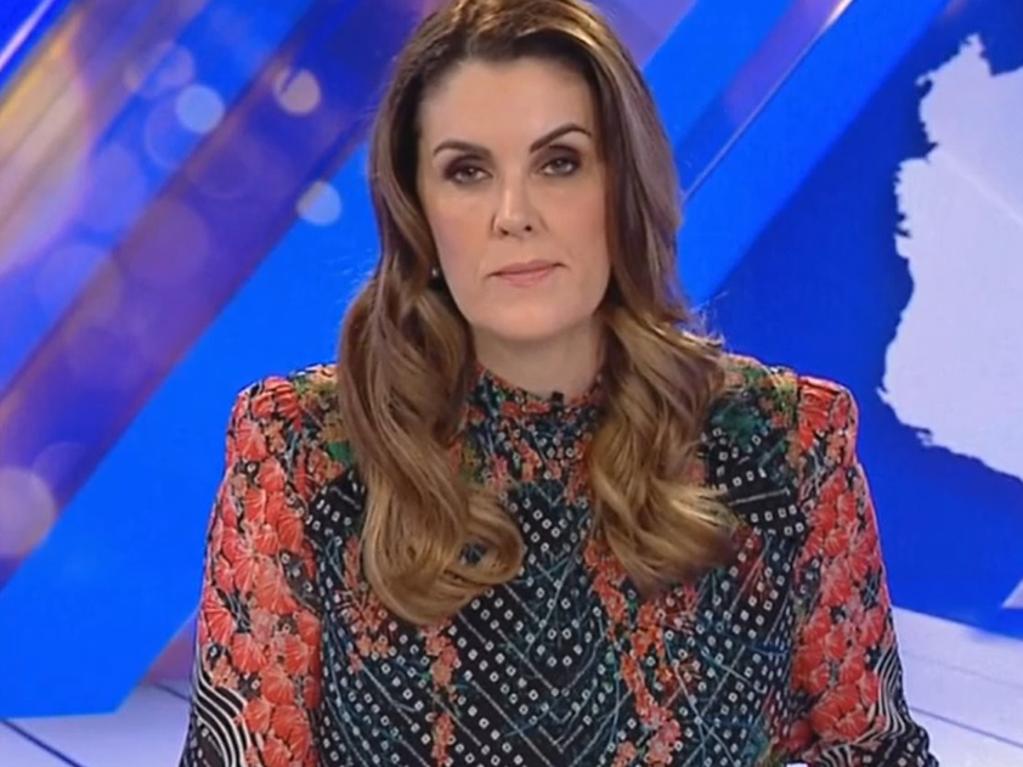
Albo grilled on ‘reparations’
On 3AW on Monday, Mitchell pressed Mr Albanese on whether it was “unreasonable” for people to read those extra pages and ask the PM, “Well, what about a treaty, what about reparations, what about truth-telling — what is your view on those three things?”
But the PM said it was “not legitimate … to pretend that that is what the referendum is about”. “There’s nothing in the Uluru Statement about reparations,” he said. “There is truth telling — well is anyone actually against telling the truth?”
“What is your view on reparations?” Mitchell said.
“I don’t support reparations,” Mr Albanese said.
“Will we have to negotiate that at some time? Regardless of the Voice, some time down the track, do we face that?” Mitchell said.
“No,” the PM said.
“What is happening with treaty is that in WA, for example, the most significant treaty-type agreement is between the Noongar and Colin Barnett’s government in 2015. That was a very significant agreement over southwestern Australia. There is some advance in Queensland, there’s legislation that passed with the support of both parties, in Victoria there’s some advance there as well.”
“But what is your view?” Mitchell said.
“My view is that the Australian people, in October or November, are going to have the opportunity to, I think, genuinely advance reconciliation by voting yes,” the PM said.
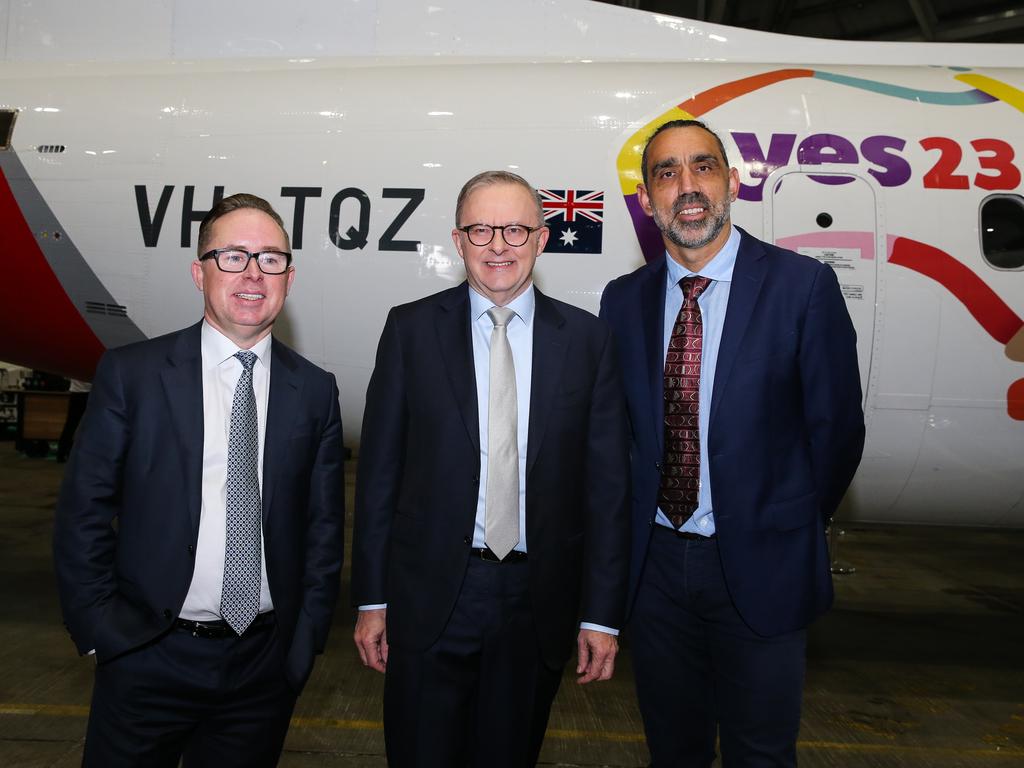
Mitchell later grilled the PM on why the Voice needed to be enshrined in the constitution if, as Mr Albanese repeated during the interview, parliament would still have ultimate authority.
“It [the parliament] can emasculate it anyway,” Mitchell said.
“Of course,” Mr Albanese said.
“So why have it in the constitution?” Mitchell said.
“So that ‘there shall be a body’,” Mr Albanese said, quoting the wording of the proposed constitutional amendment.
“And that is the request. You can’t say we want a Voice because we want to listen to Indigenous Australians, but at the very first hurdle, the form of recognition that Indigenous Australians have asked for, you say, no we know better.”
Mitchell again suggested “you can give it to them without putting it in the constitution”.
“That is not what they have asked for,” the PM said. “And it’s such a modest request.”
He likened it to shaking hands with Mitchell when he arrived at the studio that day.
More Coverage
“That’s how we greet each other with respect,” he said.
“What’s happening with the Voice here and this constitutional change is that Indigenous Australians, in spite of what has occurred to them, are putting out their hand in a gesture of friendship and reconciliation and engagement. And what I say is that Australians should grasp that hand. It is a generous and gracious request.”






